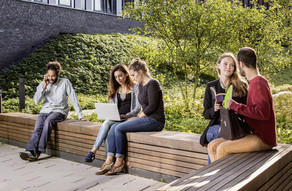Final publication of the VISITS project published
- News
- Fakultät

The publication "Vernetzung und Interaktionsarbeit in Smarten Technischen Services" (Networking and Interaction Work in Smart Technical Services) represents the conclusion of the three-year project of the same name. It was funded by the German Federal Ministry of Education and Research (BMBF) and the European Social Fund (ESF). The focus is on a phase model for the design and implementation of change processes as well as a guideline with seven guidelines for the design of good smart interaction work in the aforementioned application area. The publication is practically oriented and contains many descriptive visualizations as well as QR codes with links to videos, to help with templates and checklists and to the digitally available process model developed in the project.
Technical services such as maintenance activities are characterized by close networking and interaction between mechanical and plant engineering, service providers and user companies. The digital transformation and other challenges are challenging these interaction interfaces and significantly influencing the design of interaction work. The VISITS research project at TU Dortmund University has now developed a process model for the design and implementation of interaction-based change processes and is making this available to companies free of charge and web-based.
The research project "VISITS - Networking and Interaction Work in Smart Technical Services" (funding code: 02L18A190) has set itself the goal of analyzing inter-company collaboration in the context of digital services, identifying the mechanisms of action and identifying design options for improvement. The result of the three-year research project is a web-based adaptive process model for companies. With the help of a guideline and concrete evaluation criteria, companies can determine the status quo of their current interaction work in Smart Technical Services and make improvements through concrete implementation recommendations. The basis is a comprehensive knowledge database that also includes best practices.
The model focuses on change processes in the context of digital transformation. To ensure that planned changes are accepted by employees and can have a sustainable impact, particular emphasis was placed on a participation-oriented approach. Good interaction work is not only a central goal here, but also an important prerequisite for implementing the changes. The process model developed in the project together with the practice partners combines scientific findings with concrete practical experience. At the heart of the model are five phases that structure the process and make it easy to get started.




